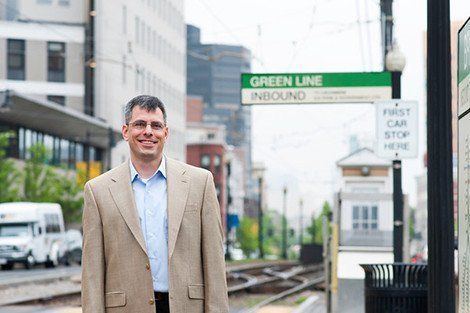May 24, 2013 — Serving more than a dozen years as a U.S. Army medical operations officer was a rich and worthwhile experience for Martin Reidy. He had three tours in Iraq under his belt and his wife, a military doctor, also served in Iraq. As a self-described “jack-of-all-trades,” Reidy carried out medical plans and operations supporting humanitarian and combat missions. His duties included deploying medics to treat casualties, sending helicopters and ambulances to evacuate the wounded, and running a mental health campaign for returning soldiers.
However Reidy felt something was missing. In 2011, he left full-time military service and enrolled as a master degree of science student in Society, Human Development and Health at Harvard School of Public Health (HSPH). On May 30, 2013, he will be among the HSPH students receiving degrees at Commencement exercises.
“I enjoyed my time in the military but I wanted to serve the poor and underserved. I want to give back to more than just those affiliated with the service,” said Reidy, who is in the Army Reserves. After considering becoming a doctor or social worker, he chose to pursue a career in public health. “I was drawn to public health by my interest in social inequalities,” he said.
Reidy hopes to land a position in health care delivery, at a community health center, or with an organization that serves the underserved in Boston.
His parents were his role models for his long-time interest in helping those less fortunate. He recalls that they once pulled a homeless man out of the snow and took him to a shelter. In the sixth grade Reidy volunteered at a neighborhood food pantry and later worked in a program for the homeless. When he was 10 or 12, he dressed as Santa Claus to deliver donations to local social service agencies.
“You are either drawn to this sort of thing, or turned away. I was drawn to it,” Reidy said. Everyone deserves to live in a home where they feel safe, have a place to sleep, stay healthy, and have someone to support them, he said.
A culture of community
After graduating from Texas Christian University with a bachelor’s degree in business, Reidy decided to don an Army uniform instead of business attire. “I didn’t want to wear a suit to work, and I thought joining the Army would look good on the resume while giving me the chance to travel and providing me the opportunity to develop strong management skills,” he said.
One of the reasons Reidy chose to attend HSPH was because he liked the “culture of community” at the School. People come from every country and belief system, but you can connect with them because of the common interest in public health, he said. “You can walk up to any table in the cafeteria and join the conversation.”
During his time at HSPH, Reidy served as leadership seminar facilitator for the Student Leadership Circle Committee. He helped plan a policy exercise on health care cost containment for the student-organized Spring Challenge last year. He served as a teaching assistant for one of his favorite classes, HPM 245 Public Health Leadership Skills, taught by [[Leonard Marcus]], lecturer on public health practice and founding co-director of the National Preparedness Leadership Initiative, and [[Barry Dorn]], adjunct lecturer on health policy and management and associate director of the NPLI.
“It’s the type of class all students should take, even if you don’t want to be a CEO or medical director,” Reidy said. “As with the Boston Marathon incident [when many at the finish line became first responders], you never know when you’ll be put in a situation and you have to be the leader.”
Photo: Aubrey LaMedica
